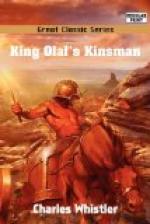Now when we reached Coggeshall village, word came to us that the Danes were gathering in force in Colchester, and that they expected Olaf to besiege them there.
“I will waste no time under Colchester walls,” he said, “but will strike inland a little; then they will come out and give us battle in the open to stay our march.”
By this time the loyal freemen of Essex had gathered to Ulfkytel in good force, and Olaf thought it would be well that he should march along the road that leads from Coggeshall to Dunmow and take that town, which is strong, so that the Danish forces should not join against us.
Therefore he left us, and would go northwards from Dunmow, taking the towns from thence to Thetford and Norwich, and he should go to Ipswich and maybe to Dunwich after this. So would all East Anglia submit. And all went well with Ulfkytel until the time came when he must turn back in haste, as I must tell presently.
Now, after he was gone, Olaf thought that it would be well to cross the Colne and Stour rivers, and so cut off the Sudbury Danes from Colchester if it might be done.
“Then there is no better place than my own,” said I, “for the road on either side of the Stour can be guarded at Bures, and I know all the country well.”
That pleased Olaf, and he said that we would take up some strong position there, and so wait to draw the Danes into the open, where he thought that one battle would do all for us.
Thus I came hack to the home that I loved and longed to see again. And when we came in the early morning to the place where the great mound of the Icenian queen towers above its woods I know not how my heart was stirred. I cannot say the things that I felt, and Olaf said:
“Let us ride on alone and see your place.”
Then we came swiftly to the crest of the hill, and I could see all that was mine by right. But it was a piteous sight for me, and my rage and sorrow made me silent as I looked.
The stockading that had been so good was broken and useless, and the church was in blackened ruins, standing among the houses where black gaps among them also showed that the Danes had been at work and that none had had heart to rebuild. Black were the ruins of my home on the hill above the village, and across the mere woods one burnt gable of Hertha’s home stood alone above the hill shoulder to show where Osgod had dwelt in the hollow of the hills beside the ford.
Then we rode across the bridge and into the street unchallenged, for all the poor folk had fled from before us thinking that we were some fresh foes. Very strange the deserted place looked to me as I sat on my horse on the familiar green, and saw the river gleam across the gap where the church had been, and missed the houses that I had known so well.
“Call aloud, Redwald,” said Olaf. “It may be that your name will bring some from their hiding.”
So I called, and the empty street echoed back the words:




